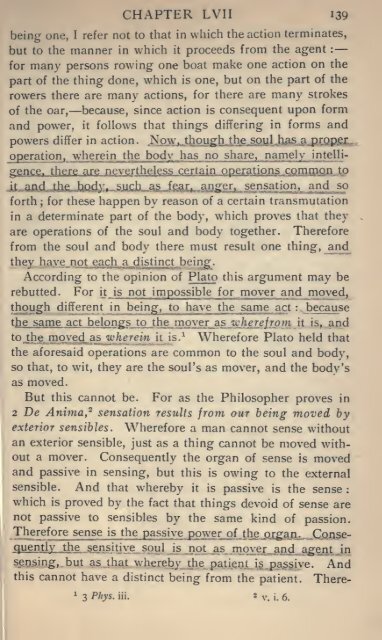summa-contra-gentiles
Summa
Summa
Create successful ePaper yourself
Turn your PDF publications into a flip-book with our unique Google optimized e-Paper software.
CHAPTER LVII<br />
i39<br />
being one, I refer not to that in which the action terminates,<br />
:—<br />
but to the manner in which it<br />
proceeds from the agent<br />
for many persons rowing one boat make one action on the<br />
part of the thing done, which is one, but on the part of the<br />
rowers there are many actions, for there are many strokes<br />
of the oar,<br />
— because, since action is consequent upon form<br />
in forms and<br />
and power,<br />
it follows that things differing<br />
powers differ in action. .Np3\\though_the<br />
soul has a proper<br />
operation, where in the body has no share, namelv intelligence^<br />
t.hei£.are,i3eYeilhsk§SL.QS^<br />
common to<br />
it and the bod}-, such as f^r, ^ng^er. -ensation, and so<br />
forth ;<br />
for these happen by reason of a certain transmutation<br />
in a determinate part of the body, which proves that they<br />
are operations of the soul and body together. Therefore<br />
from the soul and body there must result one thing, and<br />
they have not each a distinct being.<br />
According to the opinion of Plato this argument may be<br />
rebutted. For it is not i<br />
mpossib le for mover and moved,<br />
though different in bei ng, to have the same act : because<br />
the same act belongs to the mover as "wherejrom it is, and<br />
to Jhe moved asjvheremjx.<br />
is.* Wherefore Plato held that<br />
the aforesaid operations are common to the soul and body,<br />
so that, to wit, they are the soul's as mover, and the body's<br />
as moved.<br />
But this cannot be. For as the Philosopher proves in<br />
2 De Anima,^ sensation results from our being moved by<br />
exterior sensibles. Wherefore a man cannot sense without<br />
an exterior sensible, just as a thing cannot be moved without<br />
a mover. Consequently the organ of sense is moved<br />
to the external<br />
and passive in sensing, but this is<br />
owing<br />
sensible. And that whereby it is passive is the sense :<br />
which is<br />
proved by the fact that things devoid of sense are<br />
not passive to sensibles by the same kind of passion.<br />
J[^^Te{oTe sense is the passive powe r of the organ, Consequently<br />
the sensitive soul is not as mover and agent in<br />
sensing, but as that whereby the patient is passive. And<br />
this cannot have a distinct being from the patient. There-<br />
1 3 Phys.<br />
iii. * v. i. 6.


















